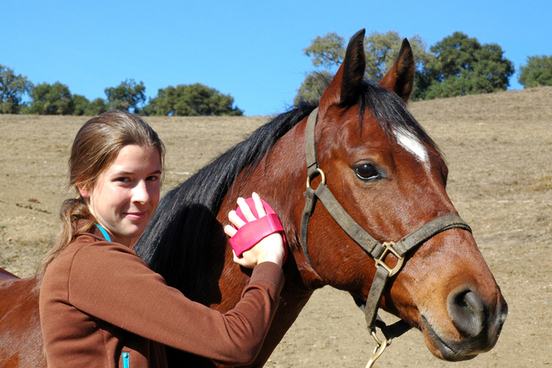
Derby
The history of the word derby is intertwined with the history of the horse races that are held annually. In America, we tend to think of the Kentucky Derby at Churchill Downs when we hear the word derby, but the original derby is an annual horse race run at Epsom Downs near London, England. The first of these races took place in the year 1780 and got its name from the race's founder, Edward Stanley, the 12th Earl of Derby. (Stanley's title comes from the name of an English county and town.)
Another guest was Sir Charles Bunbury, described as “one of racing’s great administrators” by John Carter in his book The History of Horse Racing: First Past the Post. Carter further notes that “during the celebration after the first Oaks, the Earl, whose horse had been victorious in the race, was inspired by conversations with Sir Charles Bunbury, to introduce an additional race.” The new race would be for 3-year-old colts, and it was soon determined that one of the two men would lend his name to the race, with a coin flip determining the winner. Thus, on the whim of a coin, the new race became known as the Derby.
— J. Keeler Johnson, AmericasBestRacing.net, 22 Apr. 2020
Later, people started using the word derby for important horse races in other countries, and then for any race or contest open to all comers or to a specified category of contestants—for example, a fishing derby or a bicycle derby.
The sense of derby meaning "a stiff felt hat with a dome-shaped top and a narrow brim" is first recorded in the late 19th century. Apparently, this type of hat was first made in the 1860s by a London hatter named Bowler; thus, it is called a bowler hat in England and in the United States either derby or simply bowler. No one knows just how this hat came to be called a derby, but it probably started when men began to wear such hats on sporting occasions, as when going to the races.
Americans pronounce the first syllable of derby so that it rhymes with fur, but the British pronounce it so that it rhymes with far.

Shoo-in
The word shoo originated in English as an exclamation to frighten or drive away animals (such as barnyard hens) or other pests or intruders. Its first documented appearance in writing is from the 15th century, but it was probably used in spoken language for some time before getting written down.
In the early 17th century, shoo began to be used as a transitive verb, as in "He shooed the pigeons away from the bench." Later, the verb developed an intransitive use reflecting the result of shooing, as in "When she hollers at the cat, it shoos at once." It is around 1900 that the verb began to be used figuratively in horse racing. If a racehorse was allowed to win easily, it was said to have been "shooed in"—the expression more than likely developed from the idea of the horse being shooed across the finish line.
Eventually, devotees of horse racing began to use shoo-in as a noun. At first, it was used for a predetermined or fixed race, and from that use it was extended to a horse that is a certain winner.
… a horse having no class whatever, and rarely wins only in case of a ‘fluke’ or ‘shoo in.’
— The National Turf Digest, 1928Sharp Practice wins by so far it looks like as if he is a shoo-in.
— Collier's, 11 Sept. 1937
From that point, it was only a matter of time before shoo-in passed into the general vocabulary to mean anyone or anything that is a sure winner.
Ja Morant is likely the Rookie of the Year and a shoo-in for the first team. Zion Williamson played in just 19 games, but since he was so impactful in that short time, he should make it. Kendrick Nunn, Rui Hachimura and Brandon Clarke would round out that team for me.
— Paul Hudrick, NBC Sports Philadelphia, 22 Apr. 2020

Hands down
The posture and positioning of the hands of a jockey are important during a horse race. When spectators see a jockey relax his posture and his hold on the reins, lowering his hands in the process, they know he has a great enough lead to assure victory. This type of confident, effortless finish came to be known as "winning hands down." By the mid-1800s, the expression to win hands down meant "to win easily" in horse racing and other contests.
In the early 1900s, hands down developed another use as a sentence adverb, meaning "without question," that gives emphasis to assertions.
The Chargers now have the NFL’s best uniforms, hands down
— (headline), SB Nation, 21 Apr. 2020

Ringer
The term ringer refers to someone or something that strongly resembles another. Originally, the term referred specifically to a superior racehorse that was fraudulently entered in a race under another horse's name or a fictitious name in order to obtain better odds in the betting. The racing term may derive from the practice of substituting brass for gold in rings, thus leading to the use of ringer as a term meaning "imposter" or "fake." In any case, it appears that when the racing term was coined in the late 1800s, the deception also involved disguising and substituting a superior horse that was certain to win a given race.
The term quickly extended beyond horse racing to refer to a person who strongly resembles someone else. This sense is frequently used in the phrase dead ringer.

Also-ran
In horse racing, the first three horses to cross the finish line are in the money, and it was customary for sportswriters to only write about those three prizewinners—giving their times and other details of interest—and to only mention the horses that also ran in the race at the end of the report. Eventually, these horses were referred to as also-rans and were often listed under a heading by that name.
It was won by Will Windle, on a Victor racer, in 2m. 43s. with Fred Foster, the Canadian, a close second.... Also ran, C. A. Stenken, P. I. Seufferle.
— Outing, August 1888
By the 20th century, the term also-ran was extended to competitors in other kinds of contests that did not finish as winners, and then generally to any person or thing that is of little importance or concern in a contest, election, etc.
Republicans have weeded a diverse and talented field of presidential candidates down to two finalists and a beguiling but quirky pair of also-rans....
— The Denver Post, 3 Feb. 2008A third option is to divide the animosity between the Patriots and their coach, the Tampa Bay Bucs’ quarterback and the Tampa Bay Buccaneers. This choice impacts the fans of all of these also-ran teams. Their media supporters will also have to make these difficult choices. It will be interesting to observe this in the ensuing months and years.
— Michael DeVito, Fansided.com, 22 Apr. 2020

Long in the tooth
Considering its meaning, the expression long in the tooth should probably be long of tooth. It refers to the onset of old age, and it was originally used in the 19th century to describe aging horses. A horse's teeth grow and become worn down with age; additionally, their gums recede. Thus it is possible to estimate the age of a horse by checking its teeth—the longer the teeth, the older the horse. It is for this reason that you might feel the urge to look a gift horse in the mouth, even though, as the proverb goes, you know you shouldn’t.
In time, long in the tooth came to be used to describe people as well as horses. A person who is said to be growing long in the tooth is beginning to show signs of aging.
She was lean, and yellow, and long in the tooth; all the red and white in all the toyshops of London could not make a beauty of her.
— William Makepeace Thackeray, Henry Esmond, 1852I think we do have to get a young quarterback on campus. We need to start developing someone because we have two veteran quarterbacks and both of them are long in the tooth.
— Anthony Lynn, quoted in Newsday (New York), 29 Mar. 2017
Nowadays, it is also common to find the expression describing inanimate things that are old and aging.
“My wife and I are on the same phone plan and our iPhone 7s are getting a bit long in the tooth,” this reader wrote. “We have had them for over three years, we aren’t the type of people to upgrade just for the sake of it.” The reader said buying two phones wouldn’t be a financial burden, and they typically keep phones for three years. “Does it make more sense to buy outright, or to go on a monthly installment?”
— Lisa Rowan, Lifehacker, 22 Apr. 2020

Curry favor
The expression to curry favor means "to seek to gain favor by flattery" and refers not to the gastronomic Indian curry but to the equine curry, a verb meaning "to clean the coat of a horse with a currycomb." The expression traces back to Middle English currayen favel. Favel is from French Fauvel, the name of a literary horse, and currayen favel originally meant literally "to rub down Fauvel."
The literary Fauvel is a chestnut stallion who is the main character of a 14th-century French poem, "The Romance of Fauvel." Through allegory, the poem points out and condemns the corrupt practices of contemporary government and church officials. The character of the horse represents treachery and cunning duplicity. In an attempt to gain advantage, a self-seeker would curry, or rub down, Fauvel and try to enlist the assistance of his wicked powers. Thus, the art of currying Fauvel represents the bestowing of insincere flattery in order to gain someone's favor.
Although today the expression to curry favor has become dissociated from the allegorical horse, it still implies ingratiating oneself with another.
The hotel, which sits in the renovated Old Post Office Building, has already been the subject of much scrutiny over allegations that the president is profiting from the access the hotel provides to those looking to curry favor with his administration.
— Jake Lahut, Business Insider, 21 Apr. 2020

Hack
The modern London Borough of Hackney was formed by joining three former boroughs, one of which was also called Hackney. In the Middle Ages, this Hackney was originally a town outside of London, and the people there bred horses that had an excellent reputation. In time, the horses were referred to by the town's name.
The horses of Hackney, and horses similar to them, were often available for hire. The people who hired the horses put them to work doing all sorts of things, including pulling carriages. From that use, it was a natural extension to use the name hackney for a horse-drawn carriage kept for hire.
Eventually, connotation of the word hackney shifted from the horses and vehicles to the state of being available for hire, resulting in the more general, and now obsolete, sense of "one who does menial or servile work for hire," then the verb use, "to make trite, vulgar, or commonplace" (by indiscriminate everyday use), and the derived adjective hackneyed. Through the process of shortening, hackney became hack in its original sense of a horse for hire, then for the hired carriage, and ultimately for someone, such as a writer, who is only interested in making money (and often produces substandard work as a result).
Although there is a related verb sense of the noun hack (derived from hackney), it is not the source of hack referring to illegally accessing computers. That hack is distantly connected to the "chopping" sense of the word and may have roots in the Massachusetts Institute of Technology (MIT). An early documented technical use of the verb hack is in the minutes of an April, 1955, meeting of MIT's Tech Model Railroad Club: "Mr. Eccles requests that anyone working or hacking on the electrical system turn the power off to avoid fuse blowing." It is interesting that work was juxtaposed with hack: work implies sustained or continuous effort, whereas hack suggests irregular or unskillful strokes, if you will, of effort. Although a computer is not mentioned in the minutes, there is an electrical system being "hacked," which hints at the future use of hack in the computer field.
According to known usage evidence, hack in reference to computers is first manifested in hacker in the late 1960s.
Charles Landau did some of the programming, … and W. B. Ackermann helped when the machine would not cooperate. Many other computer hackers also willingly offered advice.
— R. J. Thompson, Instabilities some Time-dependent Flows, 1969Send a computer science major over to join a research team, a computer 'hacker' to use a small DEC computer, and experienced programmer to get a programming job.
— Tech Engineering News, 1969
The earliest record of hack itself referring to the writing of computer programs occurs a few years later, which means that the verb may have been hacked from hacker.

Bangs
The word bangs has been in use since the late 19th century to describe a fringe of hair cut squarely across the forehead. The word is usually pluralized, although people have been known to speak of "hair cut in a bang" or of someone "tossing her bang aside." This bang was most likely shortened from the word bangtail, meaning "short tail," a term extending to the verb bang, meaning "to cut in or like a bang." The bangtail of a horse was so formed by allowing the hair to grow long and then cutting it horizontally across to form a tassel-like end; a racehorse with such a tail was commonly called a bangtail.
Apparently, the sight of human hair cut in a fringe over the forehead called to mind the tasseled bangtail of a racehorse. Although the connection may no longer be obvious to us when we see this hairstyle, we continue to call the straight-cut hair bangs.

Cinch
Cinch is a 19th-century borrowing of Spanish cincha, referring to a saddle girdle originally made of separate twisted strands of horsehair. These girths of braided horsehair were very strong and could be drawn so tight that a rider had no fear of the saddle slipping. The security provided by such a cinch influenced its name to be used for other things providing a sense of certainty or security. One of the earliest figurative uses of cinch, meaning "a certainty to happen," referred to a racehorse:
The racehorse owner, who has a cinch bottled up for a particular race.
— The New York World, 22 July 1888

Bidet
Bidet is a French word for a small horse, and in Middle French, bider meant "to trot." English borrowed the word for a horse in the 17th century.
I will returne to my selfe, mount my Bidet, in a dance; and corvet upon my Curtall.
— Ben Jonson, Chloridia, 1631
In the 18th century, the word was applied to a bathroom fixture about the height of the seat of a chair that one squatted above to wash one’s nether regions. The fixture was so named from the notion that one sits above a bidet as if upon a small horse.
Bidet, commonly pronounced biddy, a kind of tub, contrived for ladies to wash themselves, for which purpose they bestride it like a little French poney, or post horse, called in France bidets.
— Francis Grose, A Classical Dictionary of the Vulgar Tongue, 1785





